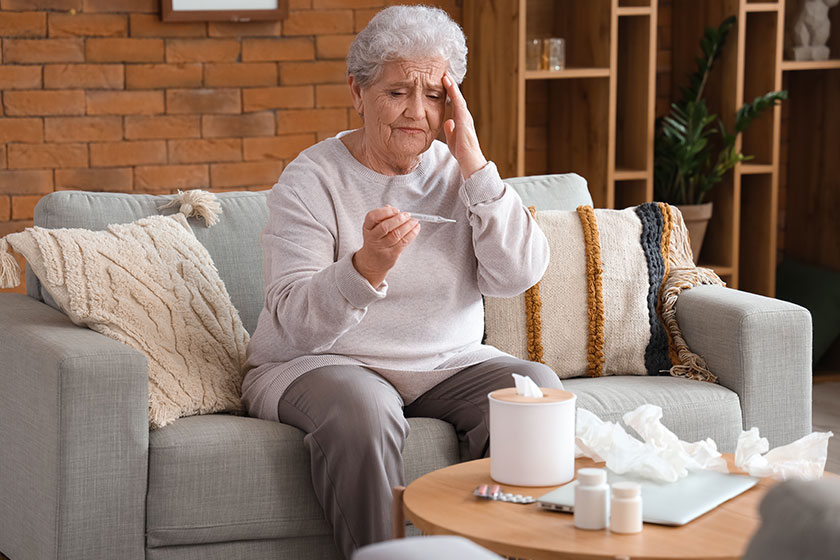Your body is a marvel of intricate systems working together to keep you healthy and strong. However, these systems may not respond as efficiently as they once did over time. This change often shows subtly, like needing more time to recover from a cold or feeling more susceptible to common illnesses.
You might have wondered why seniors get sick more easily, and understanding this process can empower you and your loved ones to take proactive steps toward a healthier lifestyle.
The immune system, your body’s natural defense against illness, plays a central role in protecting your health. As people age, the immune system becomes less robust, making it more difficult to fight infections, heal from injuries, or respond effectively to vaccines. Scientists are still studying the underlying reasons for this decline, but there are ways to adapt and stay healthy.
The Role of the Immune System in Aging
Your immune system is a complex network of cells, tissues, and organs designed to defend against bacteria, viruses, and other harmful invaders.
With age, these defenses may weaken, and their communication pathways can become less efficient. This slower response often leads to longer recovery times and an increased risk of infections.
For example, older adults may not respond as well to vaccines because their immune systems produce fewer T cells—specialized cells that help the body recognize and fight infections.
Although these changes are natural, they do not mean your health is beyond your control. By understanding how your immune system works and adopting strategies to strengthen it, you can maintain your health and vitality.
Staying Active Supports Your Health
Movement is not just beneficial for maintaining strength and flexibility; it also boosts your immune system. Regular physical activity encourages the circulation of immune cells, helping them move through your body more efficiently. This improved circulation can reduce the risk of infections and other illnesses.
In a vibrant community, activities such as group exercises, yoga, or walking clubs keep you active and create meaningful connections. These lifestyle activities are more than just physical exercise—they inspire a sense of belonging and emotional well-being that supports overall health.
The Impact of Social Connections on Wellness
Feeling connected to others plays a significant role in maintaining your health. Isolation or loneliness can hurt both emotional and physical well-being, potentially weakening the immune system. Participating in community events, area attractions, or exclusive programs designed for your interests allows you to build bonds with others while engaging your mind and spirit.
Whether joining a book club, attending guest lectures, or enjoying a creative workshop, these interactions stimulate cognitive and emotional health, which are integral to staying well.
Nutrition: Fuel for a Resilient Body
What you eat directly affects your immune system’s ability to perform its job. A balanced diet rich in fresh vegetables, fruits, whole grains, and lean proteins supplies your body with the nutrients it needs to function optimally.
Antioxidants, vitamins like C and D, and minerals such as zinc support immune health and aid in faster recovery from illnesses.
In a supportive environment, meals prepared by experienced chefs often include options that cater to both health and taste, allowing you to focus on your well-being without the stress of meal planning. Shared dining experiences also provide an additional opportunity for connection and joy.
Managing Stress for Better Immunity
Stress affects everyone, but its impact can be particularly significant as you age. Chronic stress can suppress immune function, making it more challenging to fight off illnesses. Finding ways to manage stress is important to maintain your health.
Engaging in community activities and wellness programs, or enjoying quiet moments in thoughtfully designed spaces can significantly reduce stress. These moments of relaxation and mindfulness help restore balance, allowing your body to maintain its defenses.
Prioritizing Restful Sleep
Sleep is your body’s natural way of repairing and recharging. Without adequate rest, the immune system struggles to perform its essential functions. Aim for at least seven hours of quality sleep each night. If sleep disturbances such as snoring or waking frequently are an issue, seeking guidance from a medical professional can make a significant difference.
A tranquil environment and activities that promote relaxation during the day contribute to better sleep patterns. Gentle evening programs, calming surroundings, and supportive services encourage restful nights and energized mornings.
A Holistic Approach to Golden Years
Supporting your immune system and overall health involves physical activity, proper nutrition, emotional connections, and mental stimulation. Adopting a holistic approach ensures that your golden years remain vibrant, active, and fulfilling.
Our retirement community is designed to promote well-being through engaging activities, programs, and lifestyle opportunities that celebrate your individuality.
Here, you or your loved ones can discover a new chapter filled with vitality, connection, and happiness. Visit us to explore how we can support your journey to a healthier, more vibrant life.







